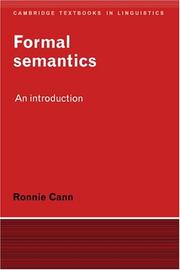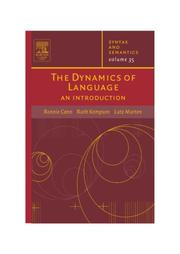| Listing 1 - 7 of 7 |
Sort by
|

ISBN: 0521376106 0521374634 113916631X 9780521374637 9780521376105 9781139166317 Year: 1993 Publisher: Cambridge Cambridge University press
Abstract | Keywords | Export | Availability | Bookmark
 Loading...
Loading...Choose an application
- Reference Manager
- EndNote
- RefWorks (Direct export to RefWorks)
This book provides a clear and accessible introduction to formal, and especially Montague, semantics within a linguistic framework. It presupposes no previous background in logic, but takes the student step-by-step from simple predicate/argument structures and their interpretation through to Montague's intentional logic. It covers all the major aspects, including set theory, propositional logic, type theory, lambda abstraction, traditional and generalised quantifiers, inference, tense and aspect, possible worlds semantics, and intensionality. Throughout the emphasis is on the use of logical tools for linguistic semantics, rather than on purely logical topics, and the introductory chapter situates formal semantics within the general framework of linguistic semantics. It assumes some basic knowledge of linguistics, but aims to be as non-technical as possible within a technical subject. Formal Semantics will be welcomed by students of linguistics, artificial intelligence and cognitive science alike.
Semantics --- Semantics (Philosophy) --- 801.56 --- 801.56 Syntaxis. Semantiek --- Syntaxis. Semantiek --- Intension (Philosophy) --- Logical semantics --- Semantics (Logic) --- Semeiotics --- Significs --- Syntactics --- Unified science --- Language and languages --- Logic, Symbolic and mathematical --- Logical positivism --- Meaning (Psychology) --- Philosophy, Modern --- Semiotics --- Signs and symbols --- Symbolism --- Analysis (Philosophy) --- Definition (Philosophy) --- Formal semantics --- Semasiology --- Semiology (Semantics) --- Comparative linguistics --- Information theory --- Lexicology --- Lexicology. Semantics --- Philosophy of language --- Semantics. --- Semantics (Philosophy). --- English language --- Sémantique --- Sémantique (Philosophie) --- Anglais (Langue) --- Arts and Humanities --- Language & Linguistics
Book
ISBN: 9780521819626 0521819628 9780521525664 0521525667 Year: 2009 Volume: *64 Publisher: Cambridge Cambridge university press
Abstract | Keywords | Export | Availability | Bookmark
 Loading...
Loading...Choose an application
- Reference Manager
- EndNote
- RefWorks (Direct export to RefWorks)
The study of meaning in language has developed dramatically over the last fifty years. Semantics is distinctive as it not only presents a general introduction to the topic, including the most recent developments, but it also provides a unique perspective for addressing current issues. It opens by introducing readers to the study of logic (natural deduction) as the background against which developments have taken place. This demonstrates the link between semantics and the study of reasoning and how this view can provide new solutions to the puzzles that have plagued the approaches presented in other textbooks. The major subject areas of semantics are discussed, including quantification, anaphora and discourse, tense and aspect, ellipsis and context, and word meaning. The book also presents state-of-the-art research in topics at the forefront of semantics.
Lexicology. Semantics --- Semantics --- Formal semantics --- Semasiology --- Semiology (Semantics) --- Comparative linguistics --- Information theory --- Language and languages --- Lexicology --- Meaning (Psychology) --- Semantiek --- 801.56 --- Syntaxis. Semantiek --- 801.56 Syntaxis. Semantiek --- Semantiek. --- Sémantique --- Manuels d'enseignement supérieur

ISBN: 0126135355 9780126135350 Year: 2005 Volume: 35 Publisher: San Diego, Calif. Academic Press
Abstract | Keywords | Export | Availability | Bookmark
 Loading...
Loading...Choose an application
- Reference Manager
- EndNote
- RefWorks (Direct export to RefWorks)
Lexicology. Semantics --- Grammar --- Grammar, Comparative and general --- Linguistic analysis (Linguistics) --- Language and languages --- Syntaxe --- Analyse linguistique (Linguistique) --- Langage et langues --- Syntax --- Philosophy --- Philosophie --- -Lexical-functional grammar --- Semantics --- 801.56 --- Formal semantics --- Semasiology --- Semiology (Semantics) --- Comparative linguistics --- Information theory --- Lexicology --- Meaning (Psychology) --- Generative grammar --- Comparative grammar --- Grammar, Philosophical --- Grammar, Universal --- Philosophical grammar --- Linguistics --- Philology --- Syntaxis. Semantiek --- Grammar, Comparative --- 801.56 Syntaxis. Semantiek

ISBN: 1575863146 Year: 2000 Publisher: Stanford, Calif. CSLI
Abstract | Keywords | Export | Availability | Bookmark
 Loading...
Loading...Choose an application
- Reference Manager
- EndNote
- RefWorks (Direct export to RefWorks)

ISBN: 0080456774 1849508739 9780080456775 9781849508735 9780126135350 0126135355 0126135363 9780126135367 0126135355 9780126135367 Year: 2005 Publisher: Amsterdam Oxford Elsevier
Abstract | Keywords | Export | Availability | Bookmark
 Loading...
Loading...Choose an application
- Reference Manager
- EndNote
- RefWorks (Direct export to RefWorks)
For the whole of the last half-century, most theoretical syntacticians have assumed that knowledge of language is different from the tasks of speaking and understanding. There have been some dissenters, but, by and large, this view still holds sway. This book takes a different view: it continues the task set in hand by Kempson et al (2001) of arguing that the common-sense intuition is correct that knowledge of language consists in being able to use it in speaking and understanding. The Dynamics of Language argues that interpretation is built up across as sequence of words relative to some context and that this is all that is needed to explain the structural properties of language. The dynamics of how interpretation is built up is the syntax of a language system. The authors' first task is to convey to a general linguistic audience with a minimum of formal apparatus, the substance of that formal system. Secondly, as linguists, they set themselves the task of applying the formal system to as broad an array of linguistic puzzles as possible, the languages analysed ranging from English to Japanese and Swahili. It argues that knowledge in language consists of being able to use it in speaking and understanding. It analyses a variety of languages, from English to Japanese and Swahili. It appeals to a wide audience in the disciplines of language, linguistics, anthropology, education, psychology, cognitive science, law, media studies, and medicine.
Language and languages --- Linguistics. --- Language Arts & Disciplines --- Syntaxis. --- Semantische interpretatie. --- Philosophy. --- Linguistics --- General.
Book

ISBN: 3110623137 311062639X 9783110626391 Year: 2019 Publisher: Berlin Boston
Abstract | Keywords | Export | Availability | Bookmark
 Loading...
Loading...Choose an application
- Reference Manager
- EndNote
- RefWorks (Direct export to RefWorks)
Discover vital research on the lexical and cognitive meanings of words. In this exciting book from a team of world-class researchers, in-depth articles explain a wide range of topics, including thematic roles, sense relation, ambiguity and comparison. The authors focus on the cognitive and conceptual structure of words and their meaning extensions such as coercion, metaphors and metonymies. The book features highly cited material - available in paperback for the first time since its publication - and is an essential starting point for anyone interested in lexical semantics, especially where it meets other cognitive and conceptual research.
Semantics. --- Lexical grammar. --- Grammar, Comparative and general --- Adjective. --- Adjective --- Generative grammar --- Lexicology --- Formal semantics --- Semasiology --- Semiology (Semantics) --- Comparative linguistics --- Information theory --- Language and languages --- Meaning (Psychology) --- Nominals --- Generative and Cognitive Linguistics. --- Linguistic Theories. --- Semantics --- Lexical grammar --- Linguistics --- Philology
Book

ISBN: 1283398893 9786613398895 311174180X 3110226618 3110184702 9783110226614 9783110253375 9783110184709 9781283398893 6613398896 Year: 2011 Publisher: Berlin Boston
Abstract | Keywords | Export | Availability | Bookmark
 Loading...
Loading...Choose an application
- Reference Manager
- EndNote
- RefWorks (Direct export to RefWorks)
Language and languages. --- Semantics. --- Semantics -- Handbooks, manuals, etc. --- Semantics --- Languages & Literatures --- Philology & Linguistics --- Formal semantics --- Semasiology --- Semiology (Semantics) --- Comparative linguistics --- Information theory --- Language and languages --- Lexicology --- Meaning (Psychology) --- Generative and Cognitive Linguistics. --- Linguistic Theories.
| Listing 1 - 7 of 7 |
Sort by
|

 Search
Search Feedback
Feedback About UniCat
About UniCat  Help
Help News
News